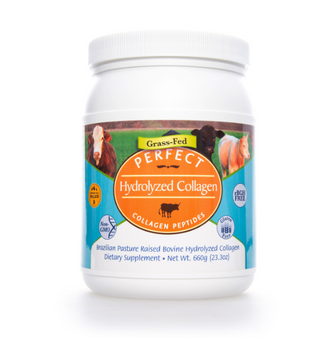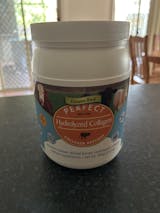Share
Collagen peptides are produced by breaking down collagen into smaller, more easily digestible molecules through hydrolysis. This process makes them more bioavailable, meaning they can be absorbed more easily by the body when consumed.
Collagen peptides are often used as a dietary supplement and are typically taken to support skin health, joint function, and overall connective tissue integrity. Some of the claimed benefits of collagen peptides include:
1. Skin Health:
Collagen peptides improve skin elasticity and hydration and reduce the appearance of wrinkles and fine lines. You'll likely notice (when taking consistently over a period of about 3 months), that your skin's texture will improve and may even have a more youthful appearance. We all like the sound of that! 😍
2. Joint Health:
Collagen peptides may help reduce joint pain and inflammation, supporting overall joint function. Collagen peptides are beneficial for joints for several reasons:
1. Collagen is a major component of cartilage, the tissue that cushions joints. As we age, collagen production decreases, leading to joint degradation. Supplementing with collagen peptides can help support the structure and integrity of cartilage, potentially slowing down the deterioration associated with ageing.
2. May Reduce Joint Pain: Studies have shown that collagen peptides can reduce joint pain, particularly in individuals with conditions like osteoarthritis. They may help by reducing inflammation and providing the necessary building blocks to repair joint tissue.
3. Enhances Joint Mobility: By improving the health of cartilage and reducing pain, collagen peptides can enhance joint mobility, making it easier to move without discomfort. This can be especially beneficial for athletes or individuals engaging in physical activities.
4. Stimulates Collagen Production: Collagen peptides can stimulate the body’s natural collagen production. This not only supports joints but also benefits skin, hair, and other connective tissues.
5. Promotes Overall Joint Health: Regular supplementation with collagen peptides may help in maintaining overall joint health by ensuring that joints remain flexible and less prone to injury.
Given their role in joint health, collagen peptides are a popular supplement among individuals looking to maintain mobility and reduce joint discomfort, especially as they age.
3. Bone Health:
They may also contribute to maintaining bone density and strength.
Collagen peptides can significantly contribute to bone health through several mechanisms:
1. Bone Structure Support: Collagen is a crucial protein in the bone matrix, accounting for about 90% of the organic bone mass. It provides a structural framework that helps bones maintain their strength and flexibility. Supplementing with collagen peptides can support this structure, making bones more resilient.
2. Enhancing Bone Mineral Density (BMD): Some studies suggest that collagen peptides can increase bone mineral density, which is vital for bone strength. Higher BMD reduces the risk of fractures and osteoporosis, especially in postmenopausal women and older adults.
3. Stimulating Osteoblast Activity: Collagen peptides can stimulate the activity of osteoblasts, the cells responsible for bone formation. This can enhance the bone-building process, leading to stronger and denser bones over time.
4. Reducing Bone Resorption: Bone resorption is the process where bone is broken down, releasing minerals into the bloodstream. Collagen peptides may help slow down this process, balancing bone formation and resorption to maintain healthy bone mass.
5. Promoting Calcium Absorption: Collagen peptides may improve the absorption and utilisation of calcium in the body, which is essential for bone strength. Calcium works in tandem with collagen to keep bones strong and healthy.
6. Supporting Overall Joint Health: By improving joint health, collagen peptides can indirectly support bone health. Healthier joints lead to better mobility, which encourages regular physical activity—a key factor in maintaining bone density.
In summary, collagen peptides can play a vital role in maintaining and improving bone health, particularly as part of a balanced diet and healthy lifestyle.
4. Lean Muscle Mass:
Some studies suggest that collagen peptides can support the maintenance and growth of muscle mass, particularly when combined with exercise.
Collagen peptides can aid in maintaining and increasing muscle mass through several key mechanisms:
1. Supports Muscle Tissue Structure: Collagen is a crucial protein in the body, providing structure to various tissues, including muscles. It is a primary component of the extracellular matrix, which surrounds muscle cells and helps maintain their structure and function. By providing the building blocks for collagen synthesis, collagen peptides can support the integrity of muscle tissue.
2. Enhances Muscle Repair and Recovery: After exercise or injury, muscles undergo repair processes that require collagen. Collagen peptides can supply the necessary amino acids, like glycine and proline, which are vital for repairing damaged muscle fibres, thereby aiding in faster recovery and reducing muscle soreness.
3. Stimulates Muscle Protein Synthesis: Research suggests that collagen peptides can stimulate muscle protein synthesis, particularly when combined with resistance training. This process is essential for muscle growth, as it leads to the development of new muscle fibres and the enlargement of existing ones.
4. Supports Tendons and Ligaments: Strong tendons and ligaments are crucial for muscle function, as they connect muscles to bones and allow for movement. Collagen peptides help strengthen these connective tissues, reducing the risk of injury and supporting overall muscle health, which can indirectly promote muscle mass.
5. Beneficial for Sarcopenia: Sarcopenia, the age-related loss of muscle mass and strength, can be mitigated by collagen peptide supplementation. By supporting muscle repair and growth, collagen peptides can help older adults maintain muscle mass and strength, which is crucial for mobility and overall health.
6. Aids in Muscle Mass Maintenance During Weight Loss: When losing weight, there's a risk of losing muscle mass along with fat. Collagen peptides can help preserve lean muscle mass during weight loss by providing the necessary nutrients for muscle maintenance.
Incorporating collagen peptides into a balanced diet, particularly when combined with regular resistance training, can help support and enhance muscle mass, making it a valuable supplement for athletes, older adults, and anyone looking to maintain or increase muscle mass.
5. Skin, Hair and Nails:
Strengthening hair follicles and reducing hair breakage also helps promote thicker, healthier hair. Hydrolyzed collagen may help improve nail strength and reduce brittleness, making nails less likely to split or break.
Collagen peptides play a significant role in improving the health of hair, skin, and nails through various mechanisms:
1. Skin Health
- Increases Skin Elasticity: Collagen is a major component of the skin, contributing to its strength and elasticity. As we age, collagen production decreases, leading to wrinkles and sagging skin. Supplementing with collagen peptides can boost skin elasticity, making it firmer and more youthful-looking.
- Hydrates the Skin: Collagen peptides help retain moisture in the skin, which is essential for maintaining a smooth, hydrated complexion. Improved hydration can reduce the appearance of fine lines and prevent dryness, leading to a more radiant look.
- Reduces Wrinkles and Fine Lines: By providing the necessary amino acids for collagen synthesis, collagen peptides can help reduce the appearance of wrinkles and fine lines. They promote the production of new collagen, which helps to fill in these signs of ageing.
- Supports Wound Healing: Collagen is crucial for the skin's repair process. Collagen peptides can accelerate wound healing by promoting the formation of new tissue, making them beneficial for skin recovery after injuries or surgeries.
2. Hair Health
- Strengthens Hair Structure: Hair is primarily composed of a protein called keratin, which is formed from amino acids like those found in collagen. Collagen peptides provide the building blocks for keratin production, which can strengthen the hair structure, making it less prone to breakage.
- Promotes Hair Growth: Collagen peptides may stimulate hair growth by providing essential nutrients to hair follicles. Healthier follicles produce stronger, thicker hair, and regular supplementation can lead to improved hair density.
- Reduces Hair Thinning: As collagen levels decrease with age, hair can become thinner and more brittle. Collagen peptides can help counteract this by supporting the hair’s structural integrity, leading to thicker and more resilient hair strands.
3. Nail Health
- Strengthens Nails: Collagen peptides can improve nail strength by providing the necessary nutrients to the nail matrix, where nail growth begins. This can lead to harder, less brittle nails that are less prone to splitting and breaking.
- Promotes Nail Growth: Regular collagen supplementation has been shown to enhance nail growth by increasing the rate at which nails grow. This is particularly beneficial for individuals with slow-growing or damaged nails.
- Improves Nail Appearance: By supporting the overall health of the nails, collagen peptides can improve their appearance, making them smoother, shinier, and less likely to develop ridges or other imperfections.
Overall Benefits
In summary, collagen peptides contribute to the overall health and appearance of hair, skin, and nails by providing essential building blocks for these tissues, enhancing their strength, and promoting their growth and repair. Regular supplementation can lead to visible improvements in the texture, strength, and vitality of these key components of beauty and self-care.
6. Gut Health:
Taking collagen peptides can positively impact gut health in several ways:
1. Supports Gut Lining Integrity
- Strengthens the Intestinal Barrier: Collagen is rich in the amino acids glycine and glutamine, which are crucial for maintaining the integrity of the gut lining. A robust intestinal barrier helps prevent a "leaky gut," a condition where undigested food particles and toxins can pass through the gut lining into the bloodstream, potentially leading to inflammation and various health issues.
Promotes Tissue Repair: Various factors, including poor diet, stress, and infections, can damage the gut lining. Collagen peptides provide the necessary building blocks for repairing and regenerating the gut lining, helping to maintain its integrity and function.
2. Reduces Gut Inflammation
- Anti-Inflammatory Properties: Glycine, one of the primary amino acids in collagen, has anti-inflammatory properties. By reducing inflammation in the gut, collagen peptides can help alleviate symptoms of inflammatory bowel conditions like IBS (Irritable Bowel Syndrome) and IBD (Inflammatory Bowel Disease).
- Soothe the Gut: Collagen peptides can help soothe the gut lining, reducing irritation and discomfort. This can be particularly beneficial for individuals with conditions like gastritis or acid reflux, whose gut lining is inflamed or damaged.
3. Aids in Digestion
- Supports Stomach Acid Production: Collagen contains amino acids that are important for the production of stomach acid, which is necessary for proper digestion. Adequate stomach acid levels ensure food is broken down efficiently, leading to better nutrient absorption and overall gut health.
- Helps with Protein Digestion: The amino acids in collagen peptides can aid in the digestion of proteins, making it easier for the body to break down and absorb nutrients from food. This can reduce the digestive burden and improve overall gut function.
4. Balances Gut Microbiome
- Feeds Beneficial Bacteria: Certain amino acids in collagen, like glycine, may fuel beneficial gut bacteria. A healthy and diverse gut microbiome is essential for good digestion, immune function, and overall well-being.
Supports Gut Healing: Collagen peptides promote the repair of the gut lining and reduce inflammation, creating an environment where beneficial bacteria can thrive, leading to a balanced and healthy gut microbiome.
5. Alleviates Symptoms of Gut Disorders
- IBS and Leaky Gut: Collagen peptides can help alleviate symptoms of IBS (Irritable Bowel Syndrome) and leaky gut by strengthening the gut lining, reducing inflammation, and supporting the healing of damaged tissues.
-Gut Motility: Collagen's role in muscle health extends to the smooth muscles in the gut, which are responsible for peristalsis—food movement through the digestive tract. Healthy gut motility is crucial for preventing issues like constipation and bloating.
Overall Impact on Gut Health
In summary, collagen peptides can profoundly impact gut health by supporting the integrity of the gut lining, reducing inflammation, aiding in digestion, balancing the gut microbiome, and alleviating symptoms of gut-related disorders. Regular supplementation can contribute to a healthier digestive system, improved nutrient absorption, and overall well-being
Taking collagen may also support many other functions, such as adrenal health, gut health, sleep, thyroid health, and blood sugar regulation, as well as having anti-inflammatory effects.
For more details, visit our other blog, '6 Surprising Benefits of Taking Collagen'.
Most Abundant Protein in the Body
Collagen is one of the most abundant proteins in the human body, but it does not comprise most of its composition. Collagen makes up about 25-30% of the total protein content in the body, which is significant, but it is not the majority by itself.
Collagen is crucial because it forms the structural framework of many tissues, including skin, bones, tendons, ligaments, and cartilage. It provides strength and elasticity to these tissues, enabling them to perform their functions effectively. There are at least 28 different types of collagen in the body, with Types I, II, and III being the most common.
Buyer Beware!
Collagen peptides can be found in various forms, including powders and capsules, as ingredients in some food and beverage products. Be aware of the source of your collagen and its purity. The best collagen supplement will be tested and contain no GMOs, glyphosate, heavy metals, or other questionable ingredients like sugars, fake sugars, fillers, or flow agents.
Choose Perfect Hydrolyzed Collagen powder to buy with confidence and peace of mind. It has been fully lab-tested (third party) and does not contain any of the nasties mentioned above. All you are getting is purity, quality, bioavailability, and benefits.
Disclaimer: These are only potential benefits. This article is purely intended for informational purposes and not as advice. One must seek proper professional advice from their trusted health practitioner.







